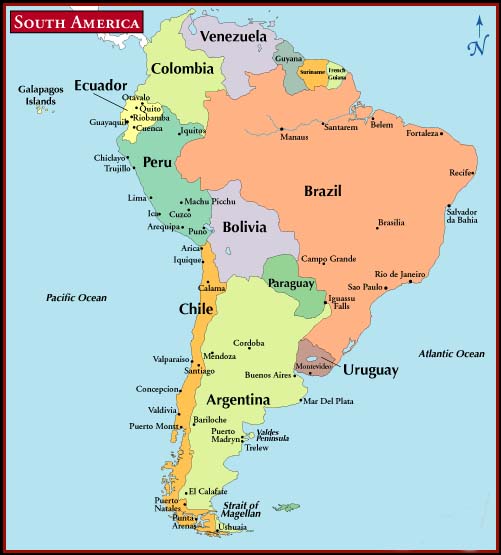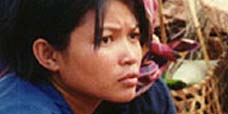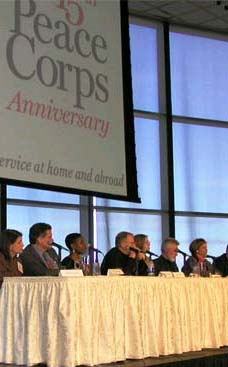2006.04.17: April 17, 2006: Headlines: COS - Uzbekistan:: The Daily Press: Uzbekistan RPCV John Smart writes: Is the U.S. 'losing' South America?
Peace Corps Online:
Peace Corps News:
Speaking Out:
January 23, 2005: Index: PCOL Exclusive: Speaking Out (1 of 5) :
Archive of Stories:
2006.04.17: April 17, 2006: Headlines: COS - Uzbekistan:: The Daily Press: Uzbekistan RPCV John Smart writes: Is the U.S. 'losing' South America?
Uzbekistan RPCV John Smart writes: Is the U.S. 'losing' South America?

This question presupposes that South America is ours to lose, and, in far too many ways, that's precisely the problem. South America has a burgeoning population with growing economies, and major change is occurring daily. These countries show definite signs of casting off the U.S. yoke that they feel around their necks. But, the people of South America can be and should be our friends. There is still residual good will there. We are all, after all, Americans. If we try to support them instead of to push them around, there is much that we can do to further hemispheric goals, ours as well as theirs.
Uzbekistan RPCV John Smart writes: Is the U.S. 'losing' South America?
Is the U.S. 'losing' South America?
A commentary by John Smart
The Daily Press
Monday, April 17th, 2006 09:37:49 AM
This question presupposes that South America is ours to lose, and, in far too many ways, that's precisely the problem. Since the Monroe Doctrine was declared in 1823 warning European powers to stay out of the Western Hemisphere, followed by Theodore Roosevelt's "Monroe Doctrine Correlary," which insisted that it was OK for the United States to interfere in the Americas all it wished "in our national interest," our attitude toward our southern neighbors has often been patronizing and bossy.
A retired economics professor in Argentina told me that he and his fellow South Americans felt as if they were being treated like "naughty children" who must frequently have their hands slapped by the U.S. government.
The latest insult was a proposal from the U.S.-dominated World Bank outlining how they would assist Argentina with its financial problems, provided they obey the Bank's orders, essentially to acceed to President Bush's demands for a hemispheric free trade pact which is perceived by them as being designed primarily to assist U.S. business interests.
But President Hugo Chavez of Venezuela came to the Argentines' rescue with some of his country's sizeable oil profits, and helped them cover their debt. They feel much more comfortable being in debt to a fellow South American nation.
President Bush was roundly booed on his trip to Argentina for the Summit of the Americas last November, with noisy demonstrators shouting "Bush Go Home" when he tried to promote his trade ideas. He made the mistake of saying that he represented "the American people," meaning the people of the United States, as though all of the others in attendance were not also "American people.”
He then made a comment to Brazilian President Lula da Silva that he had no idea that Brazil was so big! This ignorance does not sit well with Latin Americans, who view it as condescending.
Lino Gutierrez, the U.S. ambassador to Argentina, told a Wisconsin Rural Leadership group visiting the embassy in Buenos Aires in late March that much of the anti-American opinion was instigated by President Hugo Chavez, and it is certainly true that the Venezuelan leader is no fan of the Bush administration. But then, he is convinced that Washington had a hand in the attempt to overthrow his government in a 2002 coup in order to take control of the oil fields.
The coup failed miserably, lasting less than two days, but the U.S. administration was much too quick to recognize the short-lived replacement regime. Chavez was later overwhelmingly re-elected by the Venezuelan people in another free election observed by the Carter Center.
Of course, it really rankles official Washington that Chavez's best friend and mentor is none other than their arch-bugaboo, Fidel Castro.
Venezuela, Argentina, Brazil, Bolivia and several other South American nations have formed their own free-trade pact called MercoSur, which seeks to circumvent the Bush plan and allow these nations a level of freedom and cooperation within their own continental family.
Bolivia just chose Evo Morales as their new president, the first Native American ever to lead a nation in this hemisphere, and he too is a socialist who celebrated his own election by visiting Castro in Havana.
Chile recently elected the first woman chief executive of any American nation who didn't succeed a deceased husband in the job (as was the case with Isabel Peron and Violetta Chamorro). Dr. Michelle Bachelet is a pediatrician, a single mother, an atheist and a Socialist! She is also the former minister of defense, hardly a typical job for a woman in a male-dominated society. A high school student told me that many men in Chile were upset because "they are not enough comfortable with being men," as this young man surely was, which bodes well for the future.
The upcoming election in Peru appears to be headed in the same, socialist, left of center, anti-U.S. direction, with frontrunner Ollanta Humala voicing his support of Chavez, the de facto leader of the movement.
South America has a burgeoning population with growing economies, and major change is occurring daily. These countries show definite signs of casting off the U.S. yoke that they feel around their necks. But, the people of South America can be and should be our friends. There is still residual good will there. We are all, after all, Americans. If we try to support them instead of to push them around, there is much that we can do to further hemispheric goals, ours as well as theirs.
John Smart, of Park Falls, recently returned from a visit to Chile and Argentina with the Wisconsin Rural Leadership Program. He is also a member of the Governor's Commission on the United Nations and a former Peace Corps volunteer in Uzbekistan 1995-1998.
When this story was posted in April 2006, this was on the front page of PCOL:





Peace Corps Online The Independent News Forum serving Returned Peace Corps Volunteers
 | The Peace Corps Library
The Peace Corps Library is now available online with over 40,000 index entries in 500 categories. Looking for a Returned Volunteer? Check our RPCV Directory. New: Sign up to receive PCOL Magazine, our free Monthly Magazine by email. Like to keep up with Peace Corps news as it happens? Sign up to recieve a daily summary of Peace Corps stories from around the world. |
 | PCOL readership increases 100%
Monthly readership on "Peace Corps Online" has increased in the past twelve months to 350,000 visitors - over eleven thousand every day - a 100% increase since this time last year. Thanks again, RPCVs and Friends of the Peace Corps, for making PCOL your source of information for the Peace Corps community. And thanks for supporting the Peace Corps Library and History of the Peace Corps. Stay tuned, the best is yet to come. |
 | History of the Peace Corps
PCOL is proud to announce that Phase One of the "History of the Peace Corps" is now available online. This installment includes over 5,000 pages of primary source documents from the archives of the Peace Corps including every issue of "Peace Corps News," "Peace Corps Times," "Peace Corps Volunteer," "Action Update," and every annual report of the Peace Corps to Congress since 1961. "Ask Not" is an ongoing project. Read how you can help. |
 | PC announces new program in Cambodia
Director Vasquez and Cambodia's Deputy Chief of Mission Meng Eang Nay announced a historic new partnership between the Peace Corps and the Kingdom of Cambodia that will bring volunteers to this Southeast Asian country for the first time. Under King Norodom Sihamoni and Prime Minister Hun Sen, Cambodia has welcomed new partnerships with the U.S. government and other U.S. organizations. |
 | Peace Corps suspends program in Bangladesh
Peace Corps Director Gaddi H. Vasquez announced the suspension of the Peace Corps program in Bangladesh on March 15. The safety and security of volunteers is the number one priority of the Peace Corps. Therefore, all Peace Corps volunteers serving in Bangladesh have safely left the country. More than 280 Peace Corps volunteers have served in Bangladesh since the program opened in November 1998. Latest: What other newspapers say. |
 | Invitee re-assigned after inflammatory remarks
The Peace Corps has pulled the invitation to Derek Volkart to join the Morocco Training Program and offered him a position in the Pacific instead after officials read an article in which he stated that his decision to join the Peace Corps was in "response to our current fascist government." RPCV Lew Nash says that "If Derek Volkart spoke his mind as freely in Morocco about the Moroccan monarchy it could cause major problems for himself and other Peace Corps volunteers." Latest: Volkart reverses stance, takes new assignment in Paraguay. |
 | March 1, 1961: Keeping Kennedy's Promise
On March 1, 1961, President John F. Kennedy issues Executive Order #10924, establishing the Peace Corps as a new agency: "Life in the Peace Corps will not be easy. There will be no salary and allowances will be at a level sufficient only to maintain health and meet basic needs. Men and women will be expected to work and live alongside the nationals of the country in which they are stationed--doing the same work, eating the same food, talking the same language. But if the life will not be easy, it will be rich and satisfying. For every young American who participates in the Peace Corps--who works in a foreign land--will know that he or she is sharing in the great common task of bringing to man that decent way of life which is the foundation of freedom and a condition of peace. " |
 | Paid Vacations in the Third World?
Retired diplomat Peter Rice has written a letter to the Wall Street Journal stating that Peace Corps "is really just a U.S. government program for paid vacations in the Third World." Director Vasquez has responded that "the small stipend volunteers receive during their two years of service is more than returned in the understanding fostered in communities throughout the world and here at home." What do RPCVs think? |
 | RPCV admits to abuse while in Peace Corps
Timothy Ronald Obert has pleaded guilty to sexually abusing a minor in Costa Rica while serving there as a Peace Corps volunteer. "The Peace Corps has a zero tolerance policy for misconduct that violates the law or standards of conduct established by the Peace Corps," said Peace Corps Director Gaddi H. Vasquez. Could inadequate screening have been partly to blame? Mr. Obert's resume, which he had submitted to the Peace Corps in support of his application to become a Peace Corps Volunteer, showed that he had repeatedly sought and obtained positions working with underprivileged children. Read what RPCVs have to say about this case. |
 | Why blurring the lines puts PCVs in danger
When the National Call to Service legislation was amended to include Peace Corps in December of 2002, this country had not yet invaded Iraq and was not in prolonged military engagement in the Middle East, as it is now. Read the story of how one volunteer spent three years in captivity from 1976 to 1980 as the hostage of a insurrection group in Colombia in Joanne Marie Roll's op-ed on why this legislation may put soldier/PCVs in the same kind of danger. Latest: Read the ongoing dialog on the subject. |
 | Friends of the Peace Corps 170,000 strong
170,000 is a very special number for the RPCV community - it's the number of Volunteers who have served in the Peace Corps since 1961. It's also a number that is very special to us because March is the first month since our founding in January, 2001 that our readership has exceeded 170,000. And while we know that not everyone who comes to this site is an RPCV, they are all "Friends of the Peace Corps." Thanks everybody for making PCOL your source of news for the Returned Volunteer community. |
Read the stories and leave your comments.

Some postings on Peace Corps Online are provided to the individual members of this group without permission of the copyright owner for the non-profit purposes of criticism, comment, education, scholarship, and research under the "Fair Use" provisions of U.S. Government copyright laws and they may not be distributed further without permission of the copyright owner. Peace Corps Online does not vouch for the accuracy of the content of the postings, which is the sole responsibility of the copyright holder.
Story Source: The Daily Press
This story has been posted in the following forums: : Headlines; COS - Uzbekistan;
PCOL32481
32



















